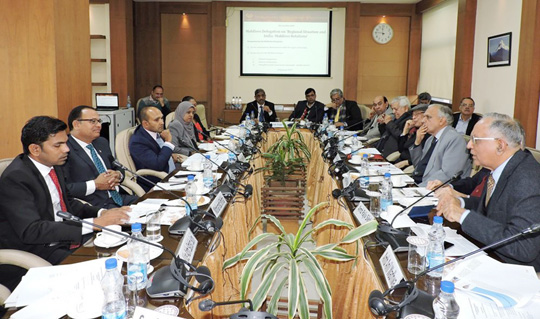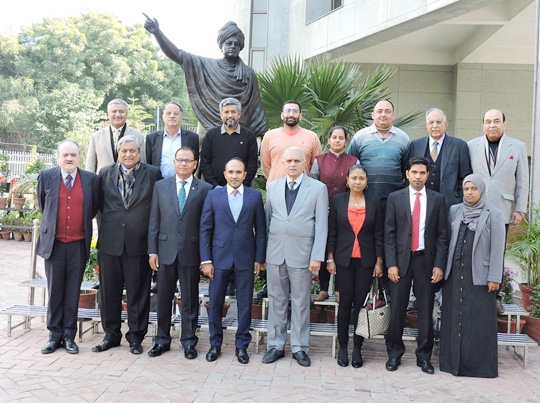On 29th of January 2019, the Vivekananda International Foundation (VIF) hosted an interaction with a delegation from the Maldives. The Maldives’ delegation was led by Mohamed Jameel Ahmed, former Vice President of the Maldives. Other members of the delegation included Dr Mohamed Jameel Ahmed, former Vice President, Govt. of the Maldives, Shidhatha Shareef, Minister for Gender, Family and Services, Govt. of the Maldives, Adam Shareef, former Minister of Defence and National Security, Govt. of the Maldives, Mohamed Shifaz, Vice President of the Maldivian Democratic Party (MDP), and Hisaan Hussain, member of Maldivian Democratic Party (MDP). The VIF was represented by many of its distinguished fellows and experts.
Post the welcome remarks touching on bilateral relations and the regional environment, Dr Arvind Gupta, Director VIF, mentioned as to how domestic instability in Maldives had put heavy strain on bilateral relations. Continuing, he said that this situation was unfortunate considering that the two countries have traditionally enjoyed close ties. The geo-strategic proximity, the location in the Indian Ocean and shared culture provide the foundation of India-Maldives relations. It was of great relief that the bilateral ties were back on track. President Solih’s State visit to India in December 2018, which was his first visit abroad after his election, has been widely appreciated. Prime Minister Modi has reiterated India’s commitment to support Maldives’ socio-economic development and strengthening of democratic and independent institutions. In this regard, India announced provision of financial assistance of up to US $ 1.4 billion in the form of budgetary support, currency swap and concessional lines of credit.

The Director also mentioned that maritime cooperation between the two countries can be enhanced further to the mutual benefit. It was a matter of satisfaction that Maldives has decided to re-join the Commonwealth and has become the latest member of Indian Ocean Rim Association. We can develop common positions in these organisations. Think-tanks can play an important role in improving mutual understanding and strengthening relations between strategic communities of the two countries. The VIF would be happy to play its role in this regard.
Opening remarks from the former Vice President of the Maldives, Dr Mohamed J. Ahmed, followed.
SAARC and Regional Cooperation
Dr. Ahmed highlighted how SAARC, which was an organisation established by its member countries in the South Asia, had not been successful to serve meaningful purpose of the regional cooperation. The Human Development Index (HDI) of SAARC member countries reflects the need for success in the operations of the SAARC. The Inter-regional trade among the SAARC countries during 1990-2011 was only 5-10 percent whereas trade among ASEAN countries was 20-30 percent. In the healthcare sector, ASEAN has better cooperation among its member countries as compared to SAARC. Economic relation is one of the key elements among the SAARC member countries. The East Asian countries have emphasised on the growth in their trade and human capital including improvement in technical literacy and healthcare. Some South Asian countries have extensive bureaucratic control over their economies, whereas Pakistan and Bangladesh had instability in their government for years. In spite of instability, Bangladesh’s per capita GDP was progressive as they believed in economic development. As a major regional power, India must play a bigger role in the SAARC.

Radicalisation and Terrorism
It was stated that there was a link between poverty, lack of basic needs and terrorism. Poverty does create an environment for terrorism to nurture. Extreme poverty in the region (from Pakistan to Bangladesh) has opened the way for extremism to reach our youth. The people of the region are law abiding citizens but on the other side the frustration among the youth regarding lack of basic resources has opened them to radicalisation. India and Maldives must come together and create employment opportunities for our youth if we want to deal with the problem or radicalisation and terrorism. However, India faces a different form of terrorism—an ‘export’ terrorism which is sponsored by its neighbour— Pakistan.
Around four years ago, Maldives had a high per capita ratio of foreign terrorist fighters who joined Islamic State (IS/ISIS) group. It was an awkward situation for the Maldives wherein more than 200 Maldivians could escape surveillance and managed to join the IS. Being an Islamic country, the Maldives could introduce models or frameworks of de-radicalisation and counter-radicalisation to counter the Islamist extremism. India could also learn through such models on how to successfully implement counter-radicalisation, particularly in the Southern parts of India like in Kerala and Tamil Nadu. The IS threat, which emerged in the Maldives, would not go away easily if there was to be only kinetic approach from the governments. Families, educational institutions and leaders of the communities must play a strong role to counter this problem. The current government in the Maldives is certain to come up with a policy to tackle the situation of radicalisation. Due to lack of proper framework of rehabilitation, it will be challenging for the Maldives to rehabilitate the wives and children of the Maldivian foreign fighters upon their return. The situation of extremism and radicalisation could be brought down by the constant coordination among the society and the government.

Social Development
The address went to state that India and the Maldives shared some similarities in culture. Maldives expects India to give a thoughtful contribution to deal with the challenges in social issues that it is facing at present. The women’s empowerment and leadership are a common challenge in both countries and should be a key point of discussion in India-Maldives relations.
The open interaction that followed covered the scope of the bilateral ties between India and the Maldives in the years ahead, including cooperation on economic and security perspective. Some of the salient points discussed are listed in following Paragraphs.
Bilateral Relations
India and the Maldives share a people-to-people relationship. India was one of the first country to recognise the Maldives’ independence in 1965. In 1972, India established its High Commission in Male as a part of diplomatic ties between both countries, whereas Maldives established its Embassy in India in 2004. Both countries shared a strong relationship in defence sector where many agreements have been signed between the defence ministers of both countries.
The foundation for new phase in bilateral relations begun with the Indian Prime Minister Narendra Modi’s visit to Male on the occasion of Presidential oath-taking ceremony of the newly elected Maldivian President Ibrahim Mohamed Solih, in November 2018. As is known, India and Maldives went through a difficult phase in between and the bilateral relations was a bit cold during the regime of former Maldivian President Abdulla Yameen. However, the visit of Indian PM Modi to the Maldives signalled improvement in the bilateral relations. Defence cooperation between both countries has ensured greater security in the region, maritime security also being an important aspect of the security cooperation. Maldives appreciated the support from India, wished India cooperates as a ‘big brother’ to the development in the Maldives, and not consider Maldives as some nation in the ‘backyard’.
The Indian side emphasised that India never believed in the occupation of the territories of its neighbouring countries. While India did support the MDP regime in Maldives, she never believed in use of force to oppose the previous regime during crisis in the Maldives. India has always been supportive economically and politically, whenever required and as and when requested by its neighbouring countries.
Security concerns of Maldives were equally important to India. Both sides agreed that China’s move and intentions to create bases in the Maldives was a security concern for India. It was reiterated that the bilateral cooperation between India and Maldives shall be irreversible for decades to come.







Post new comment